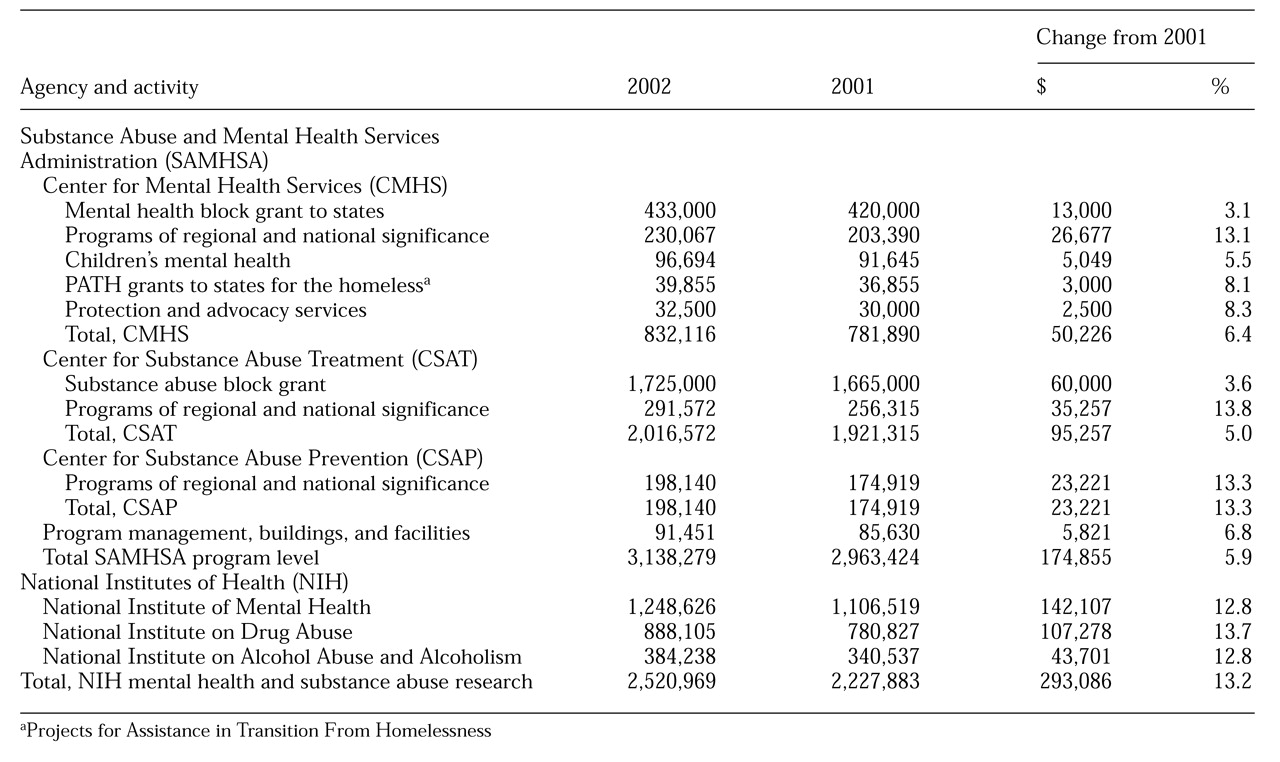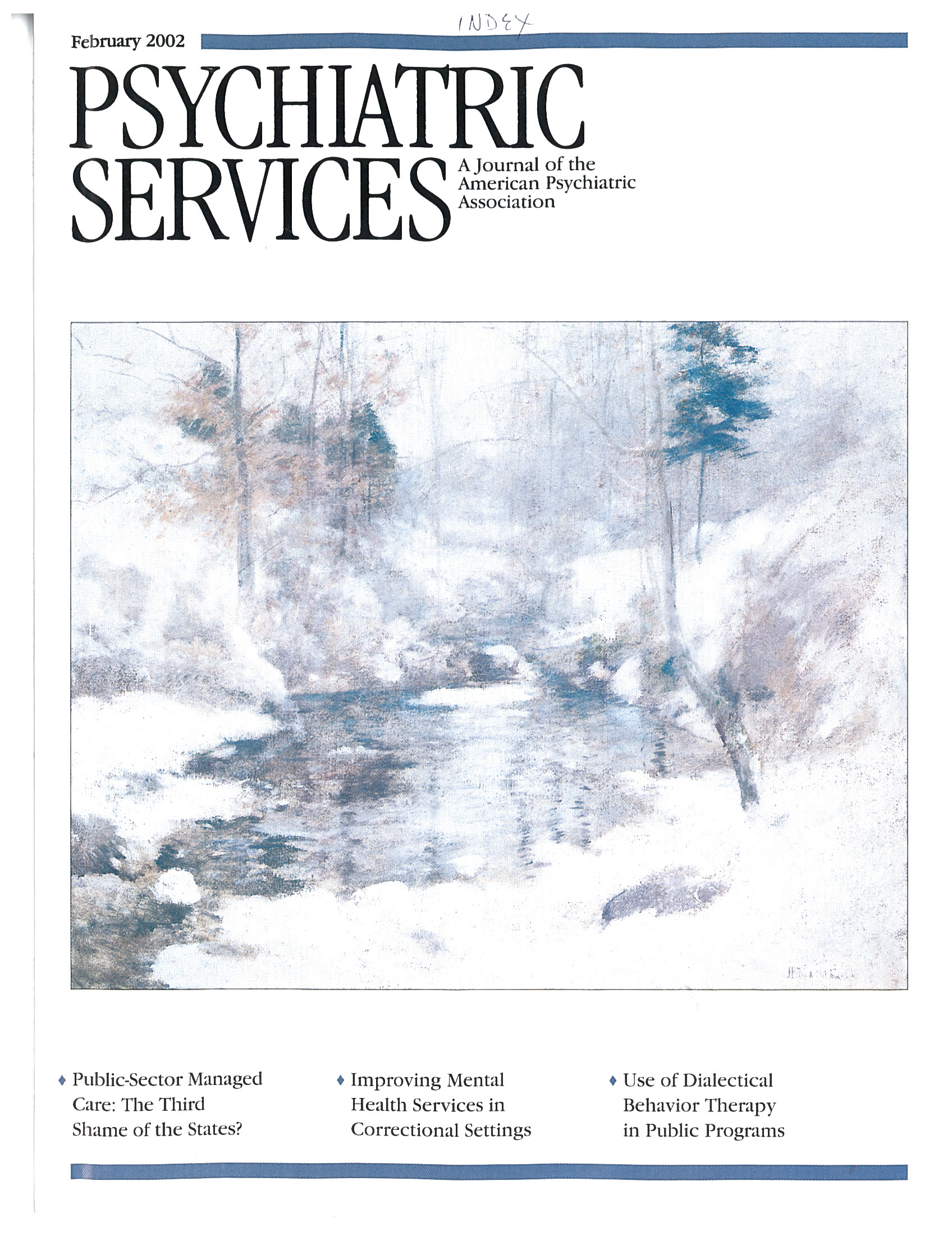Congress Fails to Pass Mental Health Parity Legislation
In mid-December members of a House-Senate conference committee voted against adding the Mental Health Equitable Treatment Act of 2001 as an amendment to the fiscal year 2000 Departments of Labor, Health and Human Services, and Education, and Related Agencies Appropriations Act (see story above). Instead they approved a one-year extension of the 1996 mental health parity law.
The Domenici-Wellstone parity amendment would have prohibited private insurers from establishing annual and lifetime limits for mental health benefits unless the same limits applied to benefits for medical illnesses. If passed, the new law would have closed loopholes in the 1996 parity law by requiring insurers that provide mental health coverage to offer those benefits at the same level as the benefits provided for physical health coverage with respect to both costs, such as deductibles, and access to services.
The amendment was approved by the Senate in October. However, the House-approved version of the appropriations bill contained only the extension of the 1996 law even though 224 Representatives—a majority of the House—signed a bipartisan letter supporting the amendment. The conference committee members voted strictly along party lines, with all seven Democrats voting for the Senate-approved amendment and all 10 Republicans against it.
According to Jay Cutler, director of government relations for the American Psychiatric Association (APA), the House conferees were "under relentless pressure from the House GOP leadership" to reject the amendment. APA and its district branches, along with advocacy organizations such as the National Alliance for the Mentally Ill, had campaigned strongly for passage of parity legislation in 2001. Cutler expressed the reactions of many to the committee vote: "It is, bluntly, deeply frustrating that a very few House leaders blocked a measure that was supported by two-thirds of the Senate and half the House. We are all pledged to redouble our efforts in the second session of the 107th Congress." He noted that President Bush has pledged to support parity in 2002.
Cutler said that "opposition to parity has essentially been reduced to two groups: the Church of Scientology and those with similar antipsychiatric views, and big-business coalitions . . . that generically oppose mandates." On the parity issue, however, the number of congressional allies of these coalitions is dwindling, according to Cutler. "Even among business groups, opposition to parity relates more to perceived cost-shifting than it does to disputes about the need for or efficacy of psychiatric treatment."
In a statement issued by APA, President Richard K. Harding, M.D., said, "A very few key powerful House leaders have blocked the millions of people in need of nondiscriminatory treatment from access to the same coverage that federal employees, including members of Congress and their staffs, already have. . . . APA serves notice that we will not go away. There is no justification for allowing discrimination to continue against psychiatric patients. This is a battle for basic civil rights for our patients that we will continue to fight."
Final Appropriations for 2002 Federal Mental Health Budget Include Substantial Increases
In late December, Senate and House conferees agreed on figures for federal health spending in fiscal year 2002. The Departments of Labor, Health and Human Services, and Education, and Related Agencies Appropriations Act, 2002, was immediately signed into law by President Bush. Funds for programs operating under the Substance Abuse and Mental Health Services Administration (SAMHSA) were increased by about 6 percent in 2002, compared with nearly 12 percent last year. The National Institutes of Health (NIH) fared better: its funds for research on mental illness and substance abuse were increased by 13 percent in 2002—slightly less than the 14 percent increase granted for fiscal year 2001.
The approved amounts for nearly all programs exceeded the budget proposed by the Bush administration. The Bush proposal contained virtually no increases for mental health programs and an overall $16 million cut for the Center for Mental Health Services (CMHS). It included larger increases for substance abuse programs than were ultimately approved by Congress.
Table 1 lists the levels of funding for federal mental health and substance abuse programs for fiscal years 2002 and 2001. The total SAMHSA budget of $3.14 billion for fiscal year 2002 is nearly $175 million more than for fiscal year 2001. CMHS received a 6 percent increase in funding, compared with an increase of nearly 24 percent last year. Funds appropriated for the CMHS block grant program rose by only 3 percent, a departure from the large increases of the previous two years—18 percent in 2001 and 23 percent in 2000.
The 2002 budget for the Center for Substance Abuse Treatment (CSAT)—$2.02 billion—represents a nearly 5 percent increase over the 2001 budget; this increase is about the same as last year's. However, the approved CSAT budget is about $5 million less than the budget proposed for that agency by the Bush administration. CSAT and the National Institute on Drug Abuse (NIDA) were the only two behavioral health programs for which the Administration proposed more funds than were granted by Congress.
The three NIH institutes that conduct research on mental illness and substance abuse received more substantial increases than the SAMHSA agencies. This year's increases of 12.8 percent for the National Institute of Mental Health and 13.7 for NIDA are similar to last year's increases—about 14 percent. The Bush proposal included a slightly larger increase for NIDA —to $9.07 million for 2002, rather than the $8.8 million approved by Congress. Funds approved for the National Institute on Alcohol Abuse and Alcoholism represent a 12.8 increase over the 2001 budget for that agency, less than the 16 percent increase it received in 2001.
The full text of the Departments of Labor, Health and Human Services, and Education, and Related Agencies Appropriations Act, 2002, is available on the Web at http://thomas.loc.gov.
News Briefs
Bazelon report on state systems of care: A report by the Bazelon Center for Mental Health Law states that most public mental health systems "have all but disintegrated" and may be headed for collapse. The 24-page report, Disintegrating Systems: The State of States' Public Mental Health Systems, is based on a review of recent materials from 35 states produced by state mental health authorities, independent commissions or task forces, advocacy organizations, and investigative journalists. The report's authors hope that advocates and state officials will use the information to educate legislators. The report is available for $4, plus $2 postage and handling, from the Bazelon Center bookstore Web site at www.bazelon.org.
Traveling exhibit on the brain: In 2002 a traveling exhibit called "Brain: The World Inside Your Head," a project of Pfizer and the National Institutes of Health, will begin a five-year tour of the country, stopping in 15 major cities. The exhibit begins with a walk through a model of a human brain and features hands-on learning stations and interactive computer displays that teach visitors about autonomic operations, the phantom-limb experience, brain tumors, and mechanisms that control perception. The exhibit addresses mental illnesses by featuring stories of well-known persons who have experienced them, such as Lincoln and Van Gogh. It also describes stigma and its effects. Information about the tour's scheduled stops is available at www.pfizer.com/ brain.


